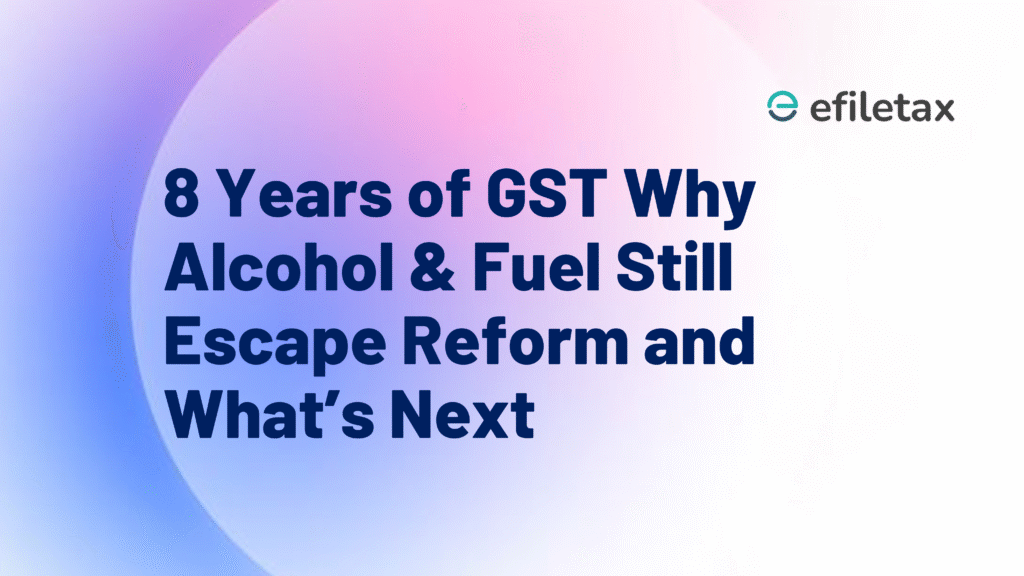
GST and Petroleum: Why They’re Still Separate After 8 Years
The Goods and Services Tax (GST) was launched on 1st July 2017 to streamline India’s complex indirect tax system. Yet, even after eight years, petroleum products and alcohol for human consumption remain outside GST, creating confusion, compliance hurdles, and cascading taxes.
Why is that? And what lies ahead? Let’s break it down.
Why Petroleum and Alcohol Are Outside GST
1. Constitutional and Legal Framework
- Alcohol is explicitly excluded from GST under Article 366(12A) of the Constitution.
- Petroleum products are technically under GST law, but tax continues under state VAT for:
- Crude Oil
- Petrol (Motor Spirit)
- High-Speed Diesel (HSD)
- Natural Gas
- Aviation Turbine Fuel (ATF)
The GST Council will decide the date of inclusion for these products as per Section 9(2) of the CGST Act, 2017.
2. State Revenue Dependency
- States earn 25%–30% of their own tax revenue from VAT on alcohol and petroleum.
- If these are brought under GST, revenue will be shared with the Centre, reducing state control.
3. Political & Fiscal Autonomy
- Alcohol taxation is politically sensitive due to social and cultural factors.
- States want to retain control over excise duties, pricing, and distribution.
4. Price Volatility of Crude Oil
- GST is a destination-based tax, whereas crude prices are globally volatile.
- Bringing petroleum under GST could cause revenue instability for both Centre and states.
Impact of Exclusion on Businesses
| Impact Area | Consequence |
|---|---|
| Input Tax Credit (ITC) | No credit for petroleum inputs → cascading tax |
| Cost to Consumers | Higher transport, logistics, and airfare costs |
| Compliance | Dual tax systems: GST + VAT/excise |
| Business Efficiency | Reduced ease of doing business, especially in logistics and aviation |
What Experts and Industry Recommend
Gradual Inclusion Strategy
- Begin with natural gas and ATF, widely used in industry and aviation.
- Even the 53rd GST Council Meeting (June 2024) saw demand for their inclusion.
Revenue-Neutral Rate Design
- A revenue-neutral GST rate can help avoid loss for both states and Centre.
- Multiple slab options or a fixed minimum rate can be explored.
Compensation Mechanism
- Like the original GST Compensation Scheme (2017–2022), a new fund can bridge revenue gaps during transition.
Flexible GST Model for Alcohol
- If alcohol is to be included, offer states the right to levy additional surcharges, maintaining some autonomy.
- This requires a Constitutional Amendment—a politically challenging move.
What Lies Ahead?
While there’s no timeline yet for bringing these under GST, the debate is active.
- Natural Gas and ATF may enter GST soon, if consensus builds.
- Alcohol inclusion remains a long shot due to political resistance.
The GST Council—with equal voting power for states and Centre—holds the key. Industry bodies like FICCI and CII have repeatedly urged for inclusion of at least industrial fuels to improve ITC efficiency and reduce costs.
Expert Tip 💡
“Start with natural gas under GST. It’s a less contentious entry point and helps MSMEs and industries immediately through ITC benefits.”
— CA Ramesh Jain, Indirect Tax Expert
Summary
Petroleum and alcohol remain outside GST even after 8 years due to state revenue dependence and legal constraints. Experts suggest starting with natural gas and aviation fuel for inclusion under GST with a compensation plan. Long-term reforms depend on political consensus and fiscal alignment.
FAQs
Q1. Is alcohol taxable under GST?
No. Alcohol for human consumption is constitutionally excluded from GST.
Q2. Can petroleum products be brought under GST?
Yes, but only when the GST Council decides. Currently, they’re taxed under state VAT.
Q3. Will businesses benefit if natural gas comes under GST?
Yes. They can claim input tax credit and reduce overall energy costs.
Q4. What’s holding back the inclusion?
State revenue loss concerns, political autonomy, and price volatility are the key reasons.
Final Thoughts & CTA
The exclusion of petroleum and alcohol from GST continues to weaken the seamless credit chain and complicate compliance. While full inclusion needs time, a phased approach starting with natural gas and ATF is both practical and necessary.
🚀 Need help with GST compliance or indirect tax planning?
Talk to our experts at Efiletax.in and streamline your tax journey today.